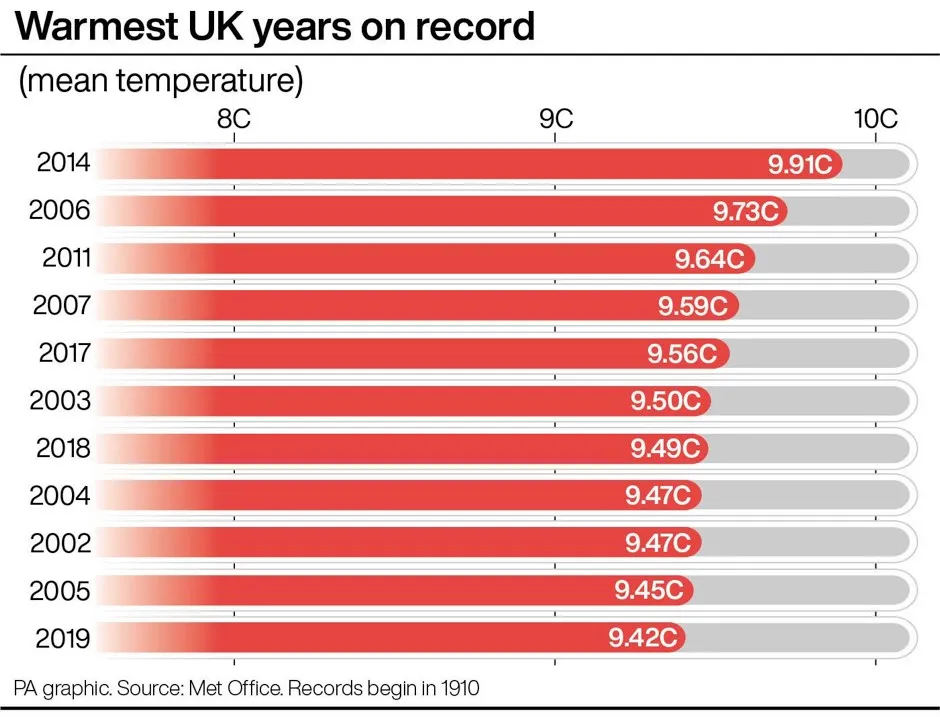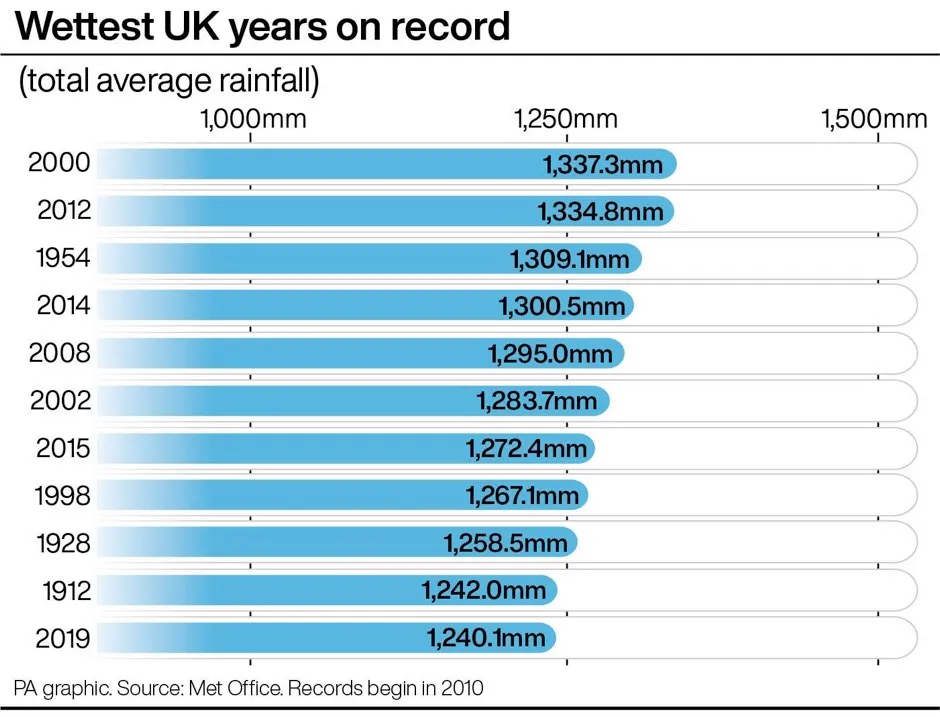The last decade was the second hottest in the past 100 years in the UK and holds eight high-temperature records, it has been revealed.
But with the climate expected to continue to warm, more records could be broken, experts have warned.
The Met Office said on Friday that the 10 years from 2010 to 2019 had been the second warmest and second wettest decade in the country over the past 100 years, slightly behind 2000 to 2009.
The 2010s also saw the highest UK daily maximum temperature records set for February, July, October, November and provisionally for December, it added.
Further records for highest daily minimum temperature were set for January, February and April between 2010 and 2019.
This compared to just one low-temperature record during this decade, with the Beast from the East in 2018 leading to the coldest March day on record with a maximum temperature of -4.7°C recorded at Tredegar in South Wales.

Dr Mark McCarthy, head of the National Climate Information Centre, said: “It is notable how many of these extreme records have been set in the most recent decade and how many more of them are reflecting high rather than low-temperature extremes: a consequence of our warming climate.”
He warned that with the warming trend in the UK expected to continue, this could see more records broken.
He added: “We are expecting the warming trend to continue through the 21st Century and we would expect these sorts of records subsequently to be broken in the future.”
Read more about climate change:
- Climate change: should we change the terminology?
- Mark Lynas: Could leaving nature to its own devices be the key to meeting the UK’s climate goals?
- If we're going to combat climate change, we need to tackle air pollution too
A spokesman for the Government said that climate change was a “national priority” and it is committed to increasing the momentum around environmental action.
The Met Office said that 2019 was provisionally the 11th warmest year on record, with a mean average temperature of 9.42C.
This puts it just outside the top 10, which have all occurred since 2002, the Met Office said.
Last year four highest temperature records were set, including the highest winter and summer temperatures and, pending verification, a potential new December maximum of 18.7°C recorded on December 28.

The year has also been the 11th wettest year on record, with mean average rainfall of 1,240.1mm. The highest mean average rainfall was 1,337.3 in 2000.
Some counties in central and eastern England such as Nottinghamshire and Lincolnshire and parts of south Yorkshire, which saw heavy rainfall through summer and autumn, have had annual rainfall figures in the top five, the Met Office said.
Dr McCarthy said the UK can expect wetter winters and drier summers in the future.
He added: “We have observed a general increase in rainfall in recent decades but that’s not evenly distributed so not everyone in the country has experienced this.
“We are expecting to see an increase in winter rainfall, so wetter winters and drier summers – but we could still experience some dry winters and wet summers.”
A Government spokesman said: “Tackling climate change is a national priority and we are determined to address it.
“We were the first major economy to set out a legally binding target to eliminate our contribution to climate change by 2050, and are the fastest in the G20 to decarbonise since 2000.
“Since 1990, we have reduced our emissions by over 40 per cent while growing the economy by over two thirds.
“But we are determined to do more to increase the momentum and drive ambitious action both in the run-up to and at this year’s COP26 talks in Glasgow.”
Reader Q&A: Do we really know what climate change will do to our planet?
Asked by: Jennifer Cowsill, via email
There is no doubt that greenhouse gas emissions caused by humans are changing our climate, resulting in a progressive rise in global average temperatures. The scientific consensus on this is comparable to the scientific consensus that smoking causes lung cancer.
Our climate is a hugely intricate system of interlinking processes, so forecasting exactly how this temperature increase will play out across the globe is a complex task. Scientists base their predictions on powerful computer models that combine our understanding of climatic processes with past climate data.
Many large-scale trends can now be calculated with a high degree of certainty: for instance, warmer temperatures will cause seawater to expand and glaciers to melt, resulting in higher sea levels and flooding. More localised predictions are often subject to greater uncertainty.
Read more:
